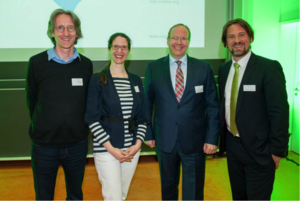
Reviewing sustainability of 100 students’ lifestyles
Nora Brüggemann, CSCP project manager, had the unique chance to review the current lifestyle sustainability of 100 students participating at the congress “Sustainable Insights”.
As the results revealed the average consumption of renewable and non-renewable resources (=the material footprint), with 25 Tonnes per year per person, is comparable to the average footprints of Germany, Finland and Spain, analysed in 2011 under the SPREAD Sustainable Lifestyles 2050 project. Results nevertheless revealed that individual results ranged between 67 and 14 Tonnes – with only 8 Tonnes being the sustainable target by the year 2050. Furthermore, the expected changes in living conditions of the students are likely to produce an increase in resource consumption (e.g. own apartment instead of shared one; own car instead of student tickets for public transport; own washing machine instead of use of parental one). These results – presented by Nora on the first day of the congress – should therefore be a stimulus and incentive for these talented young women and men as well as for all other interested parties to continuously develop and foster innovation and new business models that encourage individuals to live more sustainably (see e.g. CSCP’s partnership on Innovation and New Business Models for Sustainable Lifestyles).
The “Sustainable Insights” congress: The two-day congress “Sustainable Insights“ organised from 28-29 May 2015 in Wuppertal by Neue Effizienz and the UNESCO Chair in “Entrepreneurship and Intercultural Management” of the University of Wuppertal invited students to meet experts from industry and science and to discuss sustainability issues. Questions tackled ranged from possible ways to integrate sustainability concepts into business policy; the realistic opportunity to implement these in everyday operations; strategies for better resource efficiency and concrete solutions for more sustainable business models. On the first day over 100 students discussed sustainable development strategies with selected experts. On the second day the students worked directly on exciting ideas and concepts for committed companies.
For more information on the congress see: http://www.sustainable-insights.de
